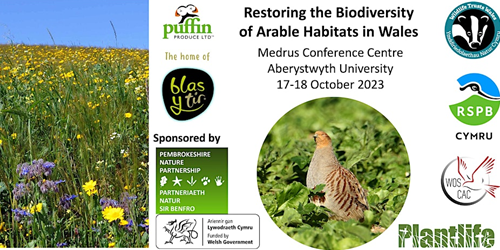
Join us to explore the best options for restoring the biodiversity of arable habitats in Wales.
Date and Time: Tue, 17 Oct 2023 10:00 - Wed, 18 Oct 2023 17:00
Location: Abersytwyth University
Full details and the agenda can be found here.
About the event:
Changes in the methods and intensity of arable management are having a devastating impact on the biodiversity associated with cultivated land. The recently published ‘Plant Atlas 2020’ found that plants associated with cultivation are the most rapidly declining species in the UK. These include iconic species such as corn buttercup (Ranunculus arvensis) and shepherd’s-needle (Scandix pecten-veneris) and, until recently at least, more common species such as corn spurrey (Spergula arvensis), corn marigold (Glebion segetum), wild radish (Raphanus raphanistrum) and charlock (Sinapis arvensis).
Strongly associated with the declining arable flora is a steep decline in farmland bird populations, particularly of seed-eating birds. The grey partridge (Perdix perdix) has already disappeared from most of Wales and other seed-dependent species are suffering similar declines; even the formerly ubiquitous yellowhammer (Emberiza citrinella) is now disappearing from the Welsh countryside.
Given the lack of biodiversity associated with agriculturally improved pastures and silage fields, the declining biodiversity of arable habitats represents a serious threat to plans for increasing ecological connectivity in the Welsh landscape. Agricultural land covers almost half of the European land area, with arable land forming some 30% of this. Agricultural land represents c.88% of the land area in Wales, with arable land representing some 6%, yet only one of more than 1000 SSSIs in Wales is designated to protect arable plants. There are no nature reserves for arable habitats or species in Wales.
This workshop will explore the options available for restoring the flora and fauna of habitats in Wales. It is timely because the new agri-environment scheme for Wales, the Sustainable Farming Scheme, is due to be rolled out in 2025, with this perhaps the last opportunity to influence the arable options available to Welsh farmers and land managers for the next decade.